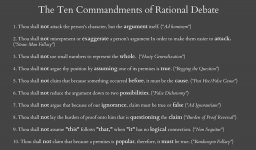- Joined
- Apr 18, 2010
- Messages
- 27,192
- MBTI Type
- INTJ
- Enneagram
- 5w6
- Instinctual Variant
- sp/sx
Ordinarily I do not find thinking aloud to help much. I prefer to think on my own, and to do research, both to answer specific questions I have and fill in missing information, and initially to get a broad sense of the topic so I even know what questions to ask. I sometimes do have additional insights about a topic after discussion, but these usually relate to tangents or extensions of the topic rather than changes in the perspective I had at the end of the discussion. Sometimes it suggests additional questions or topics to research.Do you find that thinking aloud helps, and more importantly, that sometime after the conversation, you are able to have deeper more expansive insights into the subject?
That's how I view INTJs. I think their debate style is actually quite cool and collected, but I can sometimes sense the "uh oh, I didn't see this before" dynamic flowing beneath the surface. I don't think they like to let on to others that they don't fully understand something in the moment and will instead attempt to rework their knowledge to support themselves, whether it involve incorporating the new info or walking around it by sidestepping the topic at hand almost artfully.
In the kind of discussion I was describing, the other person essentially becomes a source of information. In fact, If I get the sense that they know more about some aspect of the topic than I do, I will start asking them questions to draw this out. Sometimes they do not even realize the relevance of the information until I reassemble the pieces with it included, showing how it is different from what each of us initially thought.
It is rare that I am truly surprised in a discussion. Usually the other person's explanations and reasoning follow a predictable pattern, even if the details are unfamiliar. Or, I go into the discussion well aware of a blind spot or area of personal ignorance, state that as a caveat to my position, and ask if the other person can shed light on that aspect of the issue. I am, of course, capable of the highlighted, but I reserve this for occasions when the other person is being obnoxious or refusing to observe any standards of rational discussion.



